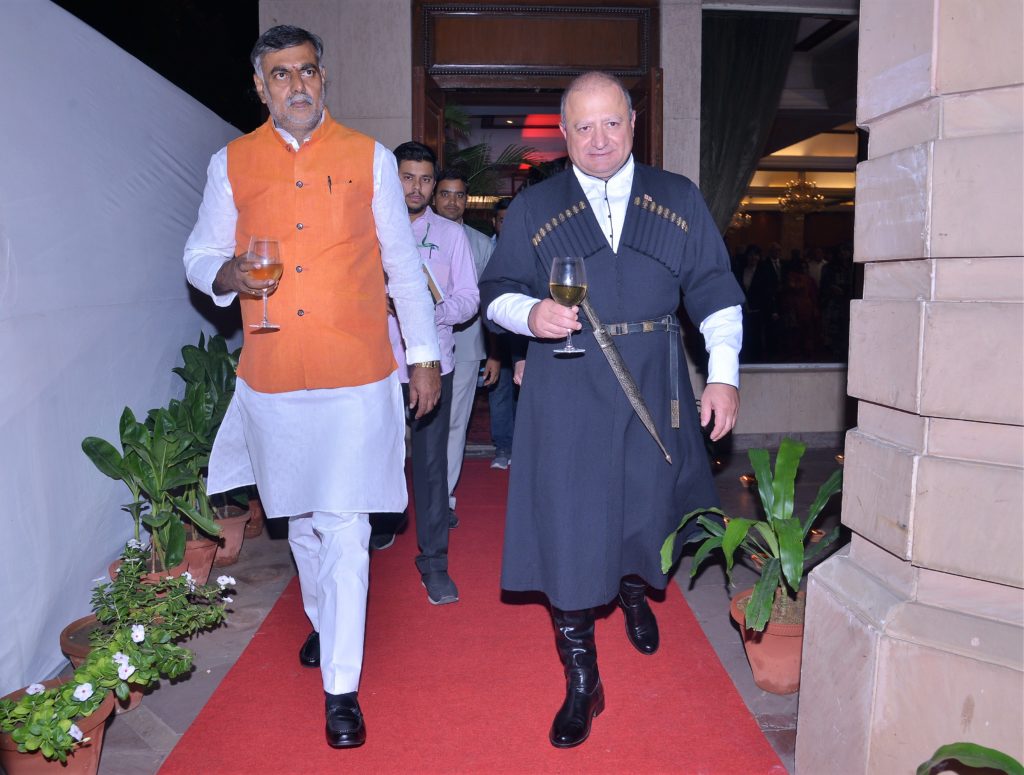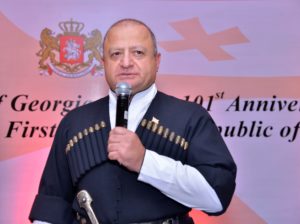A Georgian Evening in Delhi

(Left) Prahlad Singh Patel, Minister of State for Tourism & Culture and (right) Mr. Archil Dzuliashvili, the Ambassador of Georgia to India at the celebrations marking Georgian Independence Day
On September 27, 2019, the Embassy of Georgia to the Republic of India held a spectacular reception dedicated to the country’s Independence Day and to the 101st Anniversary of the Foundation of the First Democratic Republic of Georgia. The reception took place at the Taj Mahal Hotel in New Delhi.
Shri Prahlad Singh Patel, Hon’ble Minister of State (Independent Charge) for Tourism & Culture had graced the event as the Chief Guest of the Reception.
A day before the ancient beautiful country, tucked away in the Caucases, where Asia meets Europe, had marked its 101st anniversary of state independence. On this very day, 101 years ago, Georgia, had declared its independence. In 1918-1921, Georgia was legitimately considered as one of Europe’s most democratic states of that time. In 1918, Georgia, led by the coalition government and the temporary parliament consisting of multiple parties, began the democratic institutional building, in the process of which the election legislation was developed, guaranteeing the voting right to every citizen of Georgia regardless of their gender, ethnic, religious or political affiliation;
In February 1919, Georgia held the very first universal, democratic and multi-party election of its legislative body – the Constituent Assembly. Among 130 elected of the Assembly 23 members represented the ethnic minority groups. Moreover, 5 women were elected as Members at a time, when women in the majority of the European states not only lacked the opportunity to be elected, but didn’t even possess the right to vote at all;
On 12 March 2019, Georgia celebrates the 100th anniversary of Parliamentarism – the day, 100 years ago, Constituent Assembly of Georgia held its inaugural session. The landmark date has become a national celebration to Georgian people and at a time gained significant international recognition – representatives of diplomatic missions of the Great Britain, France, the United States of America, Switzerland, Spain, the Netherlands, Hellenic Republic, Poland, Ukraine, Lithuania, Czechoslovakia, Iran, Armenia and Azerbaijan were present at the first session of the Assembly;
In 1919-1921, the Constituent Assembly of the First Democratic Republic of Georgia adopted a number of significant legislative acts, initiated the inception of a judicial reform and carried out important efforts in implementing its foreign policy. Mr Nikoloz Chkheidze, the Chairman of the Constituent Assembly, headed the Georgian delegation at the Versailles Peace Conference, while the Members of the Assembly were diplomatic representatives of Georgia abroad;
The Constituent Assembly, along with the State government, implemented the most important education reform, opening up to 1200 new schools in the country; education became free and accessible for everyone; new, European-type education programmes were created; up to 100 scholars – scientists and artists, were sent to Europe to receive better education, among those: a well-known aircraft engineer – Alexander Kartveli, an also well-known engineer and businessman – Giorgi Kobakhidze (known as George Coby), famous painters – Lado Gudiashvili, Davit Kakabadze, Shalva Kikodze and others;
The Democratic Republic of Georgia attracted significant attention of European socialists, due to dominant representation of social-democrats in its government. In 1920, a large delegation of European Socialists visited Georgia, consisting of: Ramsey MacDonald, leader of Labor Party and future Prime Minister of the United Kingdom, Ethel Snowden, a British feminist politician, Émile Vandervelde and Camille Huysmans, leaders of Belgian socialist party, and others. Touring across the country, they noted the ground reality and on their return home, wrote a number of positive articles and publications about the Georgian democracy;
Elaboration of the Constitution was one of the main tasks of the Constituent Assembly. Despite the severe conditions, as a result of two years of fruitful work, the Constituent Assembly, on one of its last sessions, adopted the Constitution of Georgia in February 1921. At the time Tbilisi had already been besieged by the Red Army. The Constitution contained all the progressive democratic norms, including political and social-economic right of citizens, gender equality, ethnic minority rights, etc. The opposition parties were actively involved in the process of elaboration and the adoption of the Constitution;
Most of the members of the Constituent Assembly not only were engaged in the legislative activities, but also defended the independence of the Country with arms. In 1918-1921, the Democratic Republic of Georgia had to face a number of wars and military clashes.
After Bolshevik rule was established in Georgia, some of the members of the Assembly emigrated.
Yearlong celebrations are taking place in Georgia this year, and many events are planned.

The reception in Delhi was an opportunity to showcase Georgian culture. Guests were treated to the spectacular music performed by a three-member group from Georgia, the delectable Georgian cuisine, which included the famous khachapuri – cheese stuffed bread – spinach and garlic nuggets, similarly delicious desserts, and the heavenly wines of Georgia, which boasts of being the cradle of winemaking in the world.
Mr. Archil Dzuliashvili, the Ambassador of Georgia to India was resplendent in the Georgian national attire, “Chokha”, which is a symbol of freedom and national pride. It also represents Georgia’s centuries-old struggle to preserve its identity and dignity.
It was a premium that on the same day as the reception the World Tourism Day was proudly celebrated in New Delhi in the presence of many delegates from around the world, including Mr. Zurab Pololikashvili, the Secretary-General of UNWTO, and a Georgian himself.
As the Ambassador reminded, tourism is the most effective tool for gaining knowledge about different cultures and traditions, exploring new dimensions and discovering beauty of our planet in many parts of the world. We support and encourage tourism cooperation.
The Georgian side expressed sincere gratitude to India for supporting Georgia’s territorial integrity and sovereignty.
In the years to come India and Georgia are sure to achieve new heights of mutually beneficial partnership as both are seeking better future for their nations through the enhancement of their multi-dimensional cooperation. In this context, the rich past and present status of mutual trust and shared values of both countries impart new dynamism, strength and passion to explore new possibilities of mutual cooperation.